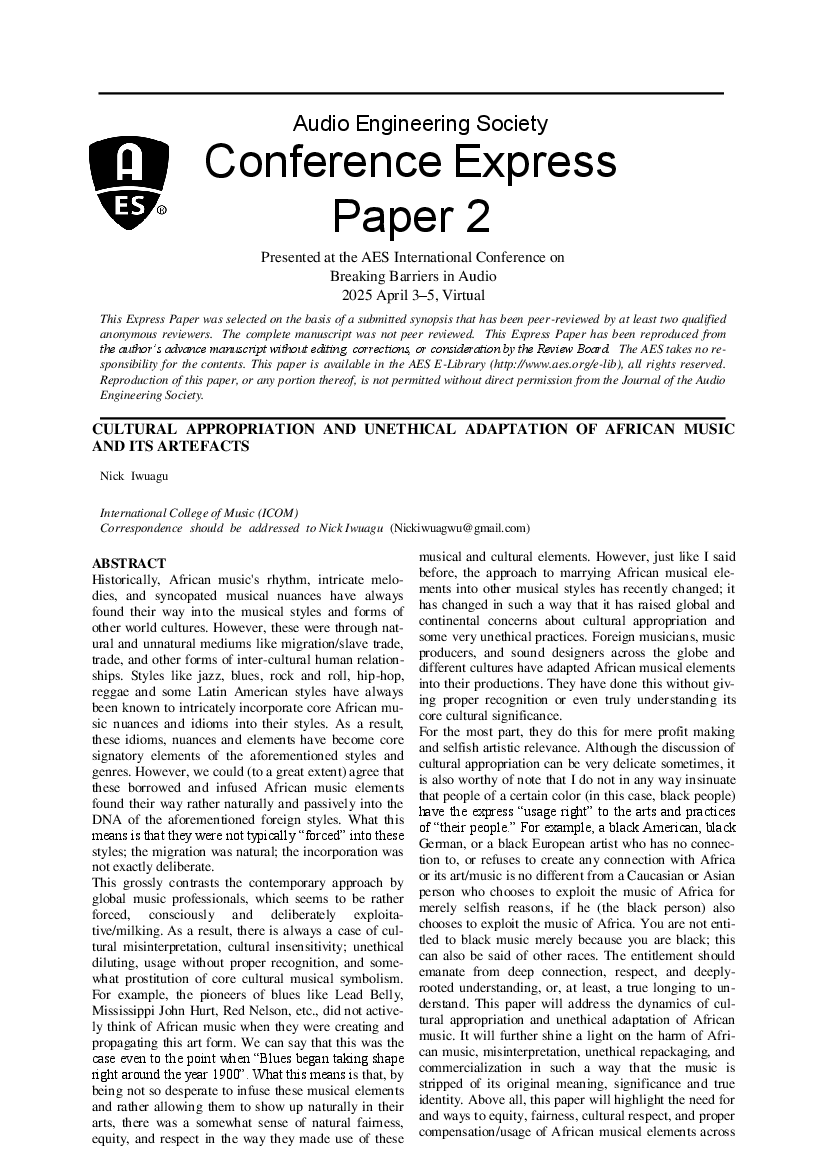Home / Publications / E-library page
You are currently logged in as an
Institutional Subscriber.
If you would like to logout,
please click on the button below.
Home / Publications / E-library page
Only AES members and Institutional Journal Subscribers can download
Historically, African music`s rhythm, intricate melodies, and syncopated musical nuances have always found their way into the musical styles and forms of other world cultures. However, these were through natural and unnatural mediums like migration/slave trade, trade, and other forms of inter-cultural human relationships. Styles like jazz, blues, rock and roll, hip-hop, reggae and some Latin American styles have always been known to intricately incorporate core African music nuances and idioms into their styles.
As a result, these idioms, nuances and elements have become core signatory elements of the aforementioned styles and genres. However, we could (to a great extent) agree that these borrowed and infused African music elements found their way rather naturally and passively into the DNA of the aforementioned foreign styles. What this means is that they were not typically forced into these styles; the migration was natural; the incorporation was not exactly deliberate.
This grossly contrasts the contemporary approach by global music professionals, which seems to be rather forced, consciously and deliberately exploitative. As a result, there is always a case of cultural misinterpretation, cultural insensitivity; unethical diluting, usage without proper recognition, and somewhat prostitution of core cultural musical symbolisms.
For example, the pioneers of blues like Lead Belly, Mississippi John Hurt, Red Nelson, etc., did not actively think of African music when they were creating and propagating this art form. We can say that this was the case even to the point when Blues began taking shape right around the year 1900 (Hansen, 2000). What this means is that, by being not so desperate to infuse these musical elements and rather allowing them to show up naturally in their arts, there was a somewhat sense of natural fairness, equity, and respect in the way they made use of these musical and cultural elements.
However, just like I said before, the approach to marrying African musical elements into other musical styles has recently changed; it has changed in such a way that it has raised global concerns about cultural appropriation and some very unethical practices. Foreign musicians, music producers, and sound designers across the globe and different cultures have adapted African musical elements into their productions. They have done this without giving proper recognition or even truly understanding its core cultural significance.
For the most part, they do this for mere profit making and selfish artistic relevance. Although the discussion of cultural appropriation can be very delicate sometimes, it is also worthy of note that I do not in any way insinuate that people of a certain color (in this case, black people) have the express usage right to the arts and practices of their people.
For example, a black American, black German, or a black European artist who has no connection to, or refuses to create any connection with Africa or its art/music is no different from a Caucasian or Asian person who chooses to exploit the music of Africa for merely selfish reasons, if he (the black person) also chooses to exploit the music of Africa. You are not entitled to black music merely because you are black; this can also be said of other races. The entitlement should emanate from deep connection, respect, and deeply-rooted understanding, or, at least, a true longing to understand.
This paper will address the dynamics of cultural appropriation and unethical adaptation of African music. It will further shine a light on the prostitution of African music, misinterpretation, unethical repackaging, and commercialization in such a way that the music is stripped of its original meaning, significance and true identity. Above all, this paper will highlight the need for and ways to equity, fairness, cultural respect, and proper compensation/usage of African musical elements across diverse styles, cultures, and musical forms.
Author (s): Iwuagu, Nick
Affiliation:
AES Nigeria Section
(See document for exact affiliation information.)
Publication Date:
2025-03-27
Import into BibTeX
Session subject:
Breaking Barriers in Audio
Permalink: https://aes2.org/publications/elibrary-page/?id=22825
(440KB)
Click to purchase paper as a non-member or login as an AES member. If your company or school subscribes to the E-Library then switch to the institutional version. If you are not an AES member Join the AES. If you need to check your member status, login to the Member Portal.

Iwuagu, Nick; 2025; Cultural Appropriation and Unethical Adaption of African Music and its Artefacts [PDF]; AES Nigeria Section; Paper 2; Available from: https://aes2.org/publications/elibrary-page/?id=22825
Iwuagu, Nick; Cultural Appropriation and Unethical Adaption of African Music and its Artefacts [PDF]; AES Nigeria Section; Paper 2; 2025 Available: https://aes2.org/publications/elibrary-page/?id=22825